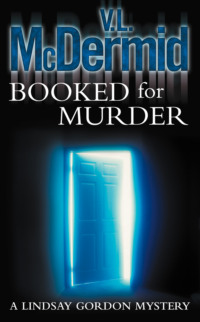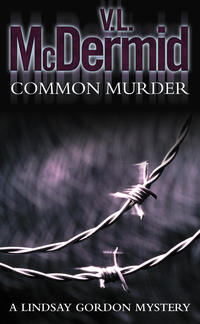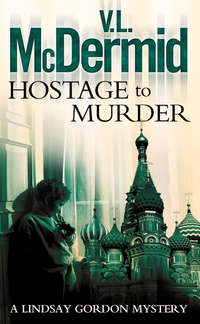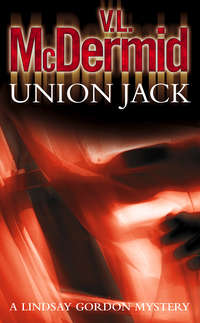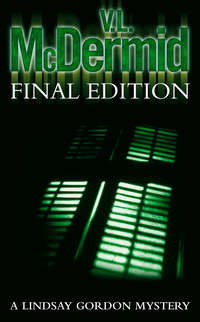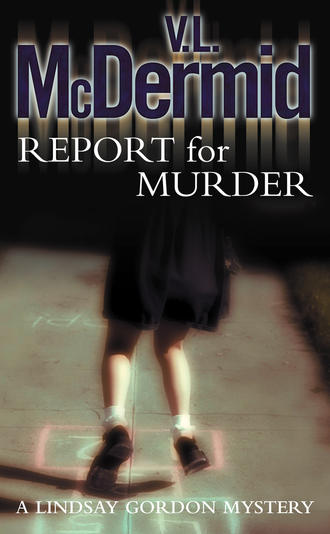
Полная версия
Report for Murder
Lindsay nodded, momentarily dumbstruck by the woman’s poise. But her professional instinct took over almost immediately and she glanced at her watch. ‘I’ll have to get a move on if I’m going to do anything tonight,’ she muttered. ‘Can I see … where it happened?’
Miss Overton thought for a moment then nodded. She walked to the door and, with a handkerchief round her fingers, delicately opened it, saying, ‘I fear I may be too late in precautions like this, since others have already opened the door. By the way, it was locked from the inside. The key was on the table by the blackboard. There was some delay while Miss Macdonald searched for the spare key.’
Lindsay crossed the threshold and stood just inside the room. What she saw made her retch, but after a brief struggle she regained control. It was her first murder victim, and it was not a pleasant sight. She realised how wise she’d been to avoid it in the past when she’d reported on violent death. Then, there had always been someone else to take over that aspect of the job. But this time it was up to her, so she forced herself to look, and to record mentally the details of the scene. There had been nothing peaceful about Lorna Smith-Couper’s end. She had been sitting on a chair facing the door, presumably playing her cello. Now she was slumped over her instrument on the floor, her face engorged and purple, her tongue sticking grotesquely out of her mouth like some obscene gargoyle. Round her neck, pulled so tight that it was almost invisible amidst the swollen and bruised flesh, was a wicked garrotte. It did indeed seem to be a cello string, with a noose at one end and a simple horn duffel-coat toggle tied on to the other end to enable the assassin to tighten the noose without tearing the flesh on his - or her - fingers.
Lindsay dragged her eyes from this horror and forced herself to look around with something approaching professional detachment. She noticed that all the windows were shut, but none of the casements appeared to be locked. Then she turned, revolted and overcome, and went back to the corridor. ‘Where can I find a quiet telephone?’ she demanded.
‘You’d be best to use the one in my study,’ said Miss Overton. ‘Ask one of the girls to show you the way. I must stay here till the police arrive. Is there anything else you need?’
‘To be perfectly blunt, I need a comment from you, Miss Overton,’ Lindsay replied awkwardly.
‘Very well. You may say that I am profoundly shocked by this outrage and deeply distressed by the death of Miss Smith-Couper. She was a very distinguished woman who reflected great credit on her school. We can only pray that the police will quickly catch the person responsible.’ With that, Miss Overton turned away. Lindsay sensed her disgust at the situation in which she found herself and understood it very well.
She walked back down the corridor towards the hall. Just before she re-emerged into the public gaze, she paused and took out her notebook. She leant on the window ledge to scribble down the headmistress’s words before her memory of them became inaccurate. For reasons which she didn’t understand at all, she was more determined than usual to be completely precise in quoting the headmistress. Then she stared briefly out into the night. The last thing she had expected was to find herself caught up in a murder and part of her resented the personal inconvenience. She was also aware of her own callous selfishness as she thought to herself, ‘Well, this is really going to screw up any chance I might have had with Cordelia.’
Then Lindsay pulled herself together, gave herself a mental ticking-off for her self-indulgence, reminded herself that as sole reporter on the spot she stood to make a bob or two, and resolutely shoved the vision of the dead musician to the back of her mind. There would be time later to examine her personal feelings. She glanced up at the gallery, but Cordelia and Paddy were no longer there. Lindsay looked around her for a face she recognised and spotted Caroline half-way up the hall. She went over to her and asked to be shown the way to Miss Overton’s study. Caroline nodded and set off at a healthy pace. Half-way down the stairs, she turned and said conversationally, ‘I say, not wishing to talk out of turn and all that, but what has happened to the Smith-Couper person? I mean, everyone staff-wise is running around in circles like a bunch of chickens with their heads cut off. What’s all the fuss in aid of? And why are the police coming?’
‘Sorry, Caroline, it’s not for me to say. I’d like to tell you, but I’d be breaking a confidence.’
‘Oh, I see, grown-up conspiracies, eh? Anything to protect the kiddie winks,’ the girl retorted, smiling.
Lindsay laughed in spite of herself. ‘Not quite. It’s just that it’s not right for me to pass on what I’ve been told in confidence.’ A little white lie, she thought, and that’s not going to fool Caroline.
‘I see. So you’re not actually dashing to the phone to tell the world’s press about murder most foul, then?’ Caroline said mischievously. They had reached Pamela Overton’s quarters, so Lindsay managed to avoid giving an answer by vanishing through the door indicated and into the study with only a word of thanks. Caroline shrugged expressively at the closed door then took herself off. Lindsay turned on a side-light and sat down at a desk which was fanatically tidy. All that adorned its surface was a telephone, a blotter and a large pad of scribbling paper. Lindsay pulled the paper towards her and roughed out two introductions. ‘A brutal murderer stalked a top girls’ boarding school last night (Saturday). A star cello player was found savagely murdered as she prepared to give a concert before a glittering audience of the rich and famous,’ read the first, destined for the tabloids. The other, for the heavies, was, ‘Internationally celebrated cellist Lorna Smith-Couper was found dead last night at a girls’ public school. Her body was discovered by staff at Derbyshire House Girls’ School, just before she was due to perform in a gala concert.’ Then she jotted down a series of points in order of priority; ‘How found? When? Why there? Overton quote. No police quote yet.’
Within minutes she was on to her first news-desk and dictating her copy to one of those remarkably speedy typists who perform the inimitable and thankless task of taking down the ephemeral prose of journalists out on the road all over the world. It was well after ten when she finished. A good night’s work, she thought, but tomorrow would be a lot tougher. She’d have to file copy again with more detail to all the dailies, and act as a liaison for Pamela Overton, her staff and the girls. And some time within the next few hours, she would somehow have to develop the roll of film in her camera. Someone would pay a good price for what were almost certainly the last photographs of the murder victim. She would, of course, have to crop Margaret Macdonald right out of the frame. No one wanted a photograph of an unknown music teacher.
She sat smoking at Pamela Overton’s desk, using the waste-paper bin as an ashtray. She was strangely reluctant to return to the centre of events where a good journalist should be. The police would be here by now, and she would have to get a quote from the officer leading the investigation. But that could wait. The police would be too busy at present to be bothered with her questions. She was jotting down a few notes to herself about her course of action in the morning when there was a knock at the door. Before she could answer, it opened and Cordelia came in.
‘I hoped I’d find you here,’ said Cordelia. ‘Paddy reckoned Pamela Overton would have sent you here to do your stuff. I’m not interrupting you, am I?’
‘No, I’d just finished phoning copy over. It’s debatable how much any of the newspapers will be able to use at this time of night. But the radio news will give it plenty of airtime, and I’m afraid that by tomorrow morning we’ll have the whole pack of journos on the doorstep. And how Pamela Overton imagines I’m going to cope with that lot, I do not know,’ Lindsay replied wearily.
‘Paddy says the boss will probably ask you to stay for a couple more days.’
‘Not beyond Monday, I’m afraid. I’ve got a dayshift on Tuesday on the Scottish Daily Clarion,
Конец ознакомительного фрагмента.
Текст предоставлен ООО «ЛитРес».
Прочитайте эту книгу целиком, купив полную легальную версию на ЛитРес.
Безопасно оплатить книгу можно банковской картой Visa, MasterCard, Maestro, со счета мобильного телефона, с платежного терминала, в салоне МТС или Связной, через PayPal, WebMoney, Яндекс.Деньги, QIWI Кошелек, бонусными картами или другим удобным Вам способом.


